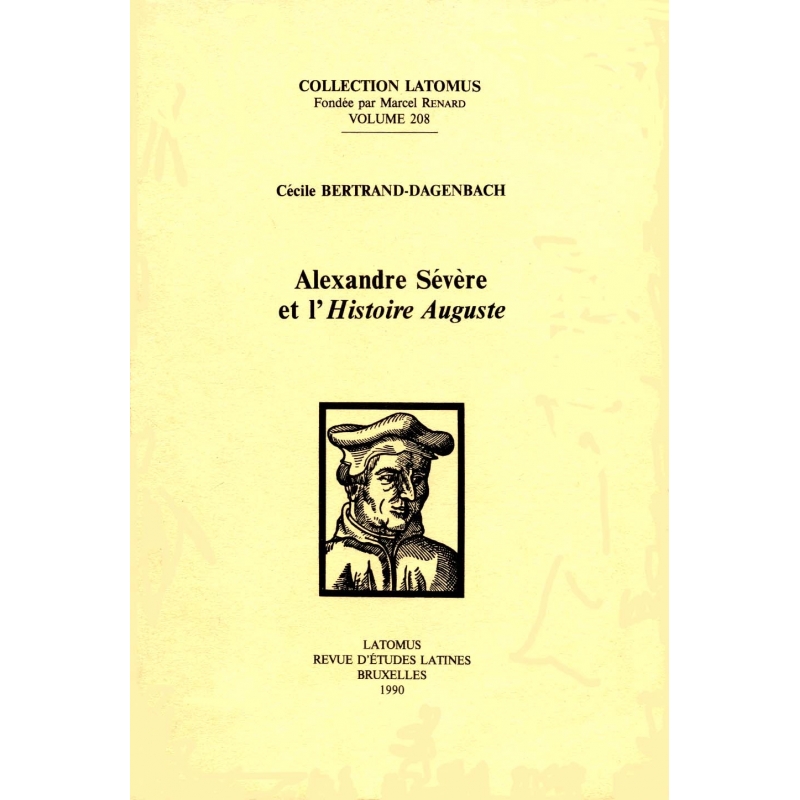- Out-of-Stock

Reference :: DLGM-060421-01
Publisher :: Librairie Hachette
Reference :: DLGM-150508-03
Publisher :: Edizioni Accademia Vivarium novum
Reference :: DLGM-150508-01
Publisher :: Edizioni Accademia Vivarium novum
Reference :: DLGM-231009-02
Publisher :: Ophrys


Bertrand-Dagenbach, Cécile.
En français,
Collection Latomus vol. 208,
Latomus Revue d'Etudes latines, 1990,
16,5 x 24,5, 216 pages,
broché, occasion, 9782870311486.
Bon état. Couverture crème un peu défraîchie.

Security policy

Delivery policy

Return policy
The Historia Augusta is a strange book. Ostensibly it is a collection of imperial biographies from Hadrian to Carinus (117-285 AD) including lives of sundry Caesars and usurpers, composed by six authors who wrote under the tetrarchs and Constantine.1 The factual content of the lives obviously varies tremendously; some of the early lives appear to be closely based on reliable sources, others are mostly fiction, some may well be nothing but. Even before the advent of modern scholarship there were doubts about what could and could not be believed. With the development of modern critical techniques, these doubts became more serious, and in 1889 Hermann Dessau solemnly pronounced the work a forgery, arguing that it was written by a single author at the end, rather than the beginning, of the fourth century.2
In the very next year, Theodor Mommsen responded to Dessau's article with a massive defense of the traditional date, though conceding that there was some later manipulation of the corpus in the age of Valentinian and Theodosius I.3 Controversy ensued. Although many classicists have remained blissfully ignorant of the consequences (readily evident these days in citations such as Spart. V. Hadr. 16.1 instead of HA V. Hadr. 16.1), the vast amount of energy expended on this matter has yielded two points that are generally accepted by almost all combatants. These are that Dessau's instinct about the date was correct, as was his view about the authorship. The first principle is based upon the study of invented names and literary allusions. The second rests on probability. Read as a whole, the work comes across as a sustained joke.4 It is hard to believe that a team would have been so consistent in its selection and handling of source material, so regular in its style of invention, or so consistent in its humor, to have produced the work that we have.5 In addition, although the more elaborate efforts to quantify this impression have been shown to be inadequate, there does not seem to be any significant variation in the prose style from the beginning to end of the collection.6
——————
1. The collection received the title Scriptores Historiae Augustae from Casaubon in his edition of 1603 on the basis of the reference to Tacitus as scriptor Historiae Augustae at HA V. Tac. 10.3. In light of the modern belief that the collection is the work of one author it is now conventional to refer to the collection simply as the Historia Augusta. For a good summary of the issues see K.-P. Johne, Kaiserbiographie und Senatsaristokratie. Untersuchungen zur Datierung und sozialen Herkunft der Historia Augusta (Berlin, 1976), 11-16.
2. H. Dessau, "Über Zeit und Persönlichkeit der S.H.A.," Hermes 24 (1889), 337-92.
3. Th. Mommsen, "Die Scriptores Historiae Augustae," Hermes 25 (1890), 228-92.
4. For a clear statement of this view see R. Syme, Historia Augusta Papers (Oxford, 1983), 218-9.
5. For a selection of bad jokes (from lives attributed to different authors) see R. Syme, Emperors and Biography (Oxford, 1971), 63.
6. I. Marriott, "The Authorship of the Historia Augusta: Two Computer Studies," JRS 69 (1979), 51-64 sought to prove unitary authorship; the methods used are shown to be faulty by D. Sansone, "The Computer and the Historia Augusta: a Note on Marriott," JRS 80 (1990), 174-7, though, as Sansone points out, the faults in Marriott's analysis in no way vitiate the observation that anyone reading the work would make, that there appears to be remarkable congruence of style throughout.
Book information
No customer reviews for the moment.
Reference :: PLGL-200822-15
Publisher :: Librairie C. Klincksieck
Reference :: PLGL-250212-01
Publisher :: Klincksieck
Reference :: PLGL-1106-27
Reference :: PLGL-250407-11
Publisher :: Editions Peeters
Reference :: PLGL-1106-53
Publisher :: Librairie C. Klincksieck
Reference :: PLGL-151010-16
Publisher :: Librairie philosophique J. Vrin
Reference :: PLGL-100812-11
Publisher :: Les Belles Lettres
Reference :: PLGL-010721-03
Publisher :: Les Belles Lettres
Reference :: PLGL-090410-07
Publisher :: Halle A. S. Max Niemeyer
Reference :: PLGL-140711-01
Publisher :: Librairie C. Klincksieck
Reference :: PLGL-060822-08
Publisher :: Klincksieck
Reference :: PH-210110-01
Publisher :: Philologicum

Bertrand-Dagenbach, Cécile.
En français,
Collection Latomus vol. 208,
Latomus Revue d'Etudes latines, 1990,
16,5 x 24,5, 216 pages,
broché, occasion, 9782870311486.
Bon état. Couverture crème un peu défraîchie.